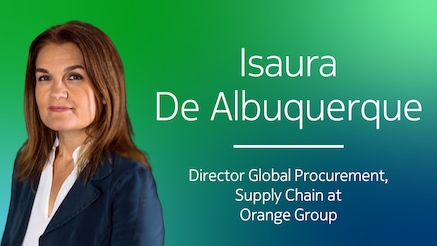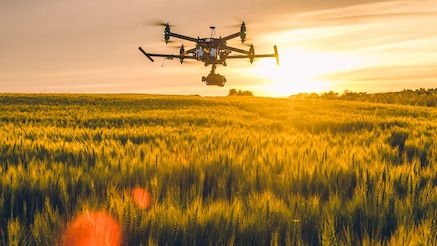Circular ambition for a sustainable world
Real Conversations podcast | S5 E11 | June 01, 2023

Biography
A graduate of ESCP Europe, Isaura has held different positions over the last 20 years in Finance within Orange, both in the B2C telco and B2B IT services areas, collaborating with Technical, Sales and Marketing departments. Previously, Isaura was the head of Controlling and Compliance for Group Technology and Innovation activities. She has contributed to several transformation projects, the development of new services and the roll out of new technologies.
The need to reach net zero has never been more important, and the Circular Economy is one key lever to achieve this in industry. Isaura De Albuquerque from Orange discusses how this is a way to "design out waste" and gain the maximum value and usage from limited resources. Above all, she stresses that it demands collaboration amongst industry players.
Below is a transcript of this podcast. Some parts have been edited for clarity.
Michael Hainsworth: France's Telecom giant, Orange, has its roots in the French Revolution, developing its first telecommunications network in 1792. Two-hundred thirty-one years later, the multinational telecom has a new revolution in mind, and it has a name, OSCAR. It's an acronym for changing the way the company, its partners and its competitors think about the impact the industry has on the planet. The Circular Economy is about reuse, and the telecom operator sees an opportunity to reduce the industry's carbon footprint by reusing existing gear for perhaps the biggest revolution of the modern age, the fourth industrial revolution. Isaura De Albuquerque is the director of Global Procurement and Supply Chain at Orange. I began our conversation by asking what the acronym, OSCAR, means.
Isaura De Albuquerque: It's for Orange Sustainable and Circular Ambition for Recertified (OSCAR). We initiated this program at the end of 2019 with the aim of developing the conditions to operate the Circular Economy in our infrastructure at Orange. Both the network and IT are looking for a way to improve financial and environmental performance. If I had to describe what OSCAR has achieved in three years, I'd say it's about scope because, finally, it has allowed us to create awareness, both inside and outside the company, to try to get a common understanding of what the implications are and the required evolution to implement the Circular Economy in the company. What does it mean to operate a Circular Economy in our core businesses? What is the financial and sustainable value we can get from that? And we have the condition that being more efficient with resources, in the context of more and more scarcity, implementing the Circular Economy also generates economic value.
MH: Let's talk about the term Circular Economy particularly because it's a phrase that a few years ago no one used, and now I'm seeing it everywhere. How do you define the Circular Economy?
IDA: From an industrial point of view, the Circular Economy is a way to design out waste. It means thinking from the beginning about how to get the maximum benefit and value from the usage of our resources in the spirit of, I would say, wasting nothing. Thinking about alternatives to optimize the use of existing resources, question systematically the need to purchase. It is really a change in the mindset and the behavior inside the company because it requires a change in our business model. And the Circular Economy is a key lever to achieve net-zero carbon in the industry because it brings a better way to be efficient in the management of resources across the value chain of the telco.
MH: You say that it requires a change to the business model. Now, for someone running an organization that recognizes the importance of being a part of the Circular Economy and reducing, reusing, recycling to lower a carbon footprint, the idea of changing a business model could be a frightening prospect. How do you go about that?
IDA: The telco industry is a really, and used to be, really, I would say, a linear economy, particularly on the technical area, on the network and the IT side; adding new technologies, adding new equipment, creating more efficiency from that. At the beginning of OSCAR, yes, it created fears, fears that this re-conditioned equipment and reused equipment would be less efficient than the new ones. We spend a lot of time explaining, creating a new understanding, putting in place new metrics in the company, new ways of measuring that, from a financial point of view, from an operational point of view, from a carbon point of view, on what does it mean, convincing internally. But we are also thinking about the way we operate it, and this is really a change.
More and more of our customers are pushing us. More and more of our B2B customers in Orange are asking for that. The best way is to work on the field, understand what it means, operate it, what it changes, how to do it efficiently with the teams, how to do it with the ecosystem together. Because, in the end, we have the same battle, I would say, in the industry to get a more sustainable supply chain, as a whole. And this is the way to go forward: working collectively in a different way to manage resources across the chain.
MH: That's a very important point that it's one thing for one organization to be focused on reducing their carbon footprint but bringing the vendors and all the members of the supply chain into the equation is certainly part of it. But I think of that more for things like factories with smokestacks and giant billowing plumes coming out of them. Tell me about the telecom industry, the main area of emissions within that business. You talk about Scope 3 when it comes to OSCAR. What does that mean?
IDA: As a service provider, we do not manufacture the components or the equipment that we are implementing in our network to provide service to the final customer. We are relying on manufacturers like Nokia, for example, to deploy our network and infrastructure. Scope 3 means our indirect emissions because it's the emissions related to what we buy, to provide a service, and the usage of our products, that we put in the hands of our customers. It represents, for a telco, this is the average, around 80-85% of the emissions of the telco in the industry. Managing Scope 3, it's a key challenge for the telco industry to achieve the net-zero carbon journey. It means several things and challenges.
The first one is being able to precisely measure the carbon impact of what we buy, of what we use in our networks. This means capturing carbon data from our partner suppliers to better understand where the relevant levels are to reduce, defining requirements together with the ecosystem, being able to identify with our partners where we can together bring ideas to reduce the carbon impact, how to push the new specifications, new ways of operating the service. Another example is how to extend the use of equipment. Okay, this is totally the opposite to the current linear economy. How do we go for more use of existing equipment instead of buying new ones? And this is a challenge for our partners also. So this is the first challenge.
The second one, in Scope 3, is really to go into a company with an ambition of reduction. By 2030 we have the ambition to reduce carbon emissions by 45% by 2030. And behind that, what is really important is to put concrete objectives inside the company to boost the Circular Economy and in Orange, regarding OSCAR, we have an objective by 2025 to have part of our CapEx, 10%, coming from refurbished equipment. This is the way to really accelerate and to boost that inside the company.
And the last, but not least, also very important thing to change and to create, really stimulate the Circular Economy is how to think differently. And we consider the way we consume raw materials in a more granular, modular way. We are an economy, a telco industry, that is really packaged, I would say, service, hardware, software, different components inside. We need to look at it in a different way, looking at the value of each piece. And so, unbundle things to think really in terms of fossil usage, each part by itself. These are the key elements, I would say.
MH: I'm fascinated by this, because I can imagine that the majority of the carbon footprint that a service provider such as yours would have would be in the equipment. Actually, powering up and running the equipment would be a much smaller fraction of the overall footprint. Do we have a sense as to what the ratio or the percentages are of how much of your carbon footprint is tied to powering equipment versus how much of your carbon footprint is tied to purchasing that initial equipment in the first place and everything that was required to make it?
IDA: 90% is related to the energy that we are using to run the network, the data center. Knowing that Orange has worked a lot to increase the renewable energy mix inside the company, so this ratio could change from one country to another, but we also have the benefits of a lot of work done inside the company three or four years ago to go for renewable energy in different areas, so solar power, purchasing power agreement with renewable energy in several countries. This is also a key lever that we work on. And we are also pushing our partners on Scope 3, for them to go in that same direction regarding the transformation of the energy mix.
MH: It sounds to me like what it means is that about 80% of the Scope 3 emissions are tied to the manufacturing side, the design, and the transportation of equipment. And therefore, it makes a ton of sense to use refurbished equipment.
IDA: Exactly.
MH: But as a geek who always likes to buy the latest and greatest toy, can you use refurbished network equipment to meet the needs of 5G in the fourth industrial revolution? I thought you needed all the new gear for that.
IDA: Yes, we can. We tend to think that 5G is a total change of the equipment in the network, that we need to move to 5G to evolve our services, to have this current generation of equipment. But it does not mean that it's a total change in resources in the infrastructure. And we try to promote a different way to manage resources and raw materials to deploy 5G within this circularity stage that we have to tackle. And with a different mindset and practice. For example, 5G refurbish equipment. By the way, Nokia is proposing the part of components with 5G refurbished equipment on the radio part. And it has worked with Nokia, totally in the collaboration around this program.
It's possible, but it's really a different way of looking at that, a granular way of looking at the way we manage resources. 5G does not require an entirely unique, I would say, set of equipment right away. There are different parts to it. And we have to think about where this new generation really is and what is the path that we can, in a much more generic way, use for different technologies. It's not the same thinking we had before, because the partners are selling bundles of everything. It's also a really a challenge for our partners, but it's possible. And by the way, we initiated it in that spirit with Nokia as an example.
MH: I've heard more than once, over the course of our conversation, about the importance of bringing the supply chain into OSCAR and reducing carbon emissions by working within the supply chain as well. So then tell me about the importance of partnerships in making OSCAR a success. How do you work with your partners to reduce your carbon footprint, on the whole, as well as within their own world too? Tell me about the secret of working with partners on this.
IDA: From the beginning, we really had the conviction that it was just not possible alone. Regarding the change it creates in operations within the company, we cannot do it together on our own because it raises questions and challenges the existing paradigm in the market. We needed to push and to influence from outside in. In the end, it's really, I would say, we have a common stake in managing scarcity and optimization of the resources that we use. We are in a world of scarcity. With more and more shortages in components, future crises and shortages are probably to come also and will continue. It's a limited resource environment. Our thinking at the beginning was either we compete further in that scarcity of resources, or we work with the ecosystem to see collectively how we can manage the resources better. That's why we began the journey with the ecosystems.
The thinking, the state of mind that we have was to promote what we call cooperation beyond competition. We think that we need to work, and we need to cooperate with the other operators because, in the end, we will be looking for the same; how to make better use of the resources, how to preserve the impact on the planet. So, this cooperation is, I would say, just a question of sustainability for the future because we need to transform. We need to change the standards. We need to bring new ways of operating and create the required scale in the telco industry. We need to create new standards and new economics for a more circular economy. In that spirit, we have, as an example, worked under the umbrella of GSMA, and GSMA was a total endorsement of that.
We have worked with 20 other operators. As an example, at Mobile Work Congress 2022, we presented a Strategy Paper for Circular Economy: Network Equipment. The strategy paper aims at outlining the opportunities to create a global and unified vision for the whole ecosystem. But we also try to be very concrete when we share that with our partners, and we put in that paper not only a strategic direction but that the Circular Economy is absolutely a question for the future. But we also put concrete recommendations, nine key recommendations, on how we can progress towards greater circularity together. And we continue the journey behind this strategy paper. We launched, with some of those operators, working groups to work concretely on some thematic to initiate some concrete actions visible from our partners.
One is carbon standardization in the measurement, so there's lot of work together externally. The second one is about how do we have an opportunity to create a unified marketplace between telcos. So, this is very concrete. What does it mean? How to make it happen, which benefits for whole. It's always very tricky; this working group are with 5, 6 operators, that will be the bulk and then to multiply if you achieve a result. And the last working group is about equipment life extension. This is, for me, a key one. How do we create the same business model? Which equipment we can extend? How do we put the standards of that? How do we own both our partners in the same rules and standards? And this is the objective of this third working group that is working together today. These are examples, but we also have examples with our partners. We try also to have regular exchange, brainstorming, with our suppliers on the network, also to find solutions together, to help us implement that.
MH: If there was one thing you wanted the listener of this conversation to walk away with, what would the key takeaway be for you?
IDA: Cooperation beyond competition, for me, is absolutely key and we can do it. It's not because we are competitors that we cannot do it. This cooperation is the only way to create economics from that Circular Economy and scale. For me, this is absolutely key. We cannot, as a telco, succeed. We have to put in place the new models with our partners. This has to be a game with our partners. So how do we create the operating models for that? It has to be with Nokia, with other partners because, in the end, this is the only way to do it. And how we really think collectively about the management of those resources because, in the end, this is about cooperation between the telcos but also cooperation with the partners.
And the second one is to implement, in fact, test the field because we see inside Orange that there are also a lot of obstacles inside. Resistance, I think in French, but yes, resistance from the internal. It has taken a long time really to get people on board, to create awareness, to make them understand that. It has to be concrete inside. Work concretely on projects, demonstrate that it's totally feasible, and also in the operations on the field. It's really an end-to-end, I would say, perspective, the Circular Economy; ecosystem in one side and the low field operations really to succeed that.



